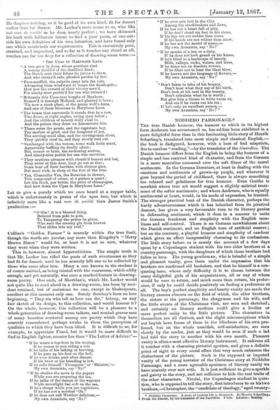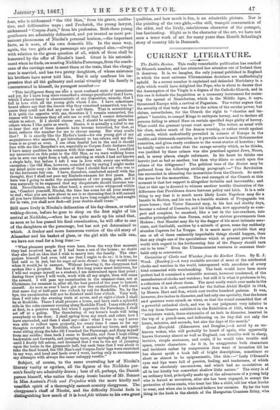NODDEBO PARSONAGE.*
Tan true Danish humour, the humour to which in its highest form Andersen has accustomed us, has seldom been exhibited in a more delightful form than in this fascinating little story of Henrik Scharling's, translated into most simple and classical English,— the book is disfigured, however, with a host of bad misprints, due to careless "reading,"—by the translator of the Guardian. The Danish humour differs from the English in being the humour of a simple and less reserved kind of character, and from the German in a more masculine command over the soft fibres of the moral sentiments. In the German literature, at least in dealing with the emotions and sentiments of grown-up people, and wherever it goes beyond the period of childhood, there is always something too relaxed and gelatinous for true humour. Even Goethe is mawkish where true art would suggest a slightly satirical treat- ment of the softer sentiments ; and where Andersen, who is equally sentimental at heart, would, in his mode of expression, be ironical. The stronger practical bent of the Danish character, perhaps the hardy adventurousness which it has inherited from its piratical descent, has given a very favourable turn to its literary genius in delineating sentiment, which it does in a manner to unite the German frankness and simplicity with the English man- liness and self-control. There is no German mawkishness about the Danish sentiment, and no English tone of artificial reserve ; but on the contrary, a playful humour and simplicity of candour which gives an effect inexpressibly charming to its confessions. The little story before us is merely the account of a few days spent by a Copenhagen student with his two elder brothers at a country parsonage, with the daughters of which these brothers had fallen in love. The young gentleman, who is brimful of a simple and pleasant vanity, goes there under the impression that his brothers are confirmed old bachelors, and that he himself is a con- quering hero, whose only difficulty it is to choose between the many delightful girls of his acquaintance, all or any of whom would be sure to return, and much more than return, his prefer- ence, if only he could decide positively on feeling a preference at all. The boy's perfect simplicity and hearty vanity are made the literary camera obscura on the field of which, the elder brothers, the sisters at the parsonage, the clergyman and his wife, and the little events of the Christmas visit, are seen and sketched ; and certainly no literary medium could give a livelier or more perfect unity to the little picture. The characters in themselves are all distinct, and the slight misconceptions which our boyish hero forms of them in the blindness of his own pro- found, but on the whole unselfish, self-satisfaction, are seen clearly by the reader, just as they would be seen if such a lad
had told the story to another with his own mouth. Pleasant vanity is often a most effective literary instrument. It enlivens all it touches with a charming pictorial egotism, and gives a definite point of sight to every social effect that very much enhances the distinctness of the picture. Such is the supposed or imputed vanity of the young narrator of the Christmas story at Niiddebo Parsonage, and a more agreeable specimen of literary vanity we have scarcely ever met with. It is just sufficient to give a sparkle and gaiety to the story, and not sufficient to hide the real traits of the other characters. Nicolai, the Copenhagen student in ques- tion, who is supposed to tell the story, first introduces to us his two brothers, —Christopher, the "candidate of theology," aged twenty-
* NOcIdetv Parsonage. A story of country life iu Danmark. By Henrik &Marling. From the Danish, by the translator of the Guardian. 2 Tole. Leaden: Bentley. four, who is nicknamed "the Old Man," from his grave, medita- tive, and deliberative ways ; and Frederick, the young lawyer, nicknamed "Corpus Juris," from his profession. Both these young gentlemen are admirably delineated, and yet treated as mere per- manent phenomena of Nicolai's personal horizon,—the important facts, as it were, of his own domestic life. In the same way, again, the two girls at the parsonage are portrayed also,—always with relation to the great question of all, which of them shall be honoured by the offer of Nicolai's hand. Great is his astonish- ment when he finds, on nearing Noddebo Parsonage, from the coach- man of the carriage sent to meet them at the train, that the clergy- man is married, and has two pretty daughters, of whose existence his brothers have never told him. But it only confirms his im- pression that all the gallantry and social vivacity of his family is concentrated in himself, its youngest member :— "This intelligence flung me bite a most confused state of uneasiness and joy, for I have long since remarked a strange peculiarity that I have, which I almost fancy is characteristic of my disposition namely, that I fall in love with all the young girls whom I see. I have sometimes heard others say that the reason why they remained unmarried, was be- cause they could not find any one to suit them. That is astonishing! It is quite the opposite with me, therefore if I remain unmarried, the reason will be because they all suit me so well that I cannot determine -which to select. If I should choose one, I should be setting aside ten others whom I like quite as much. Hence, it is actually a relief to me to hear that any of these damsels have become betrothed, for that, at least, reduces the number for me to choose among. But what avails that? It is exactly like the Hydra's head—for one young girl of my acquaintance who marries, I get introduced to ten others, and my dis- tress is as great as ever. I am often fearful lest in the end it should fare with me like Burydan's ass, especially as Corpus Juris declares that I have many qualities in common with that same ass. Once I confided my uneasiness on this point to the Old Man, as we were walking home arm in arm one night from a ball, on arriving at which I had not known a single lady, but before I left I was in love with every one without exception ; the Old Man, however, consoled me by saying I might make my mind quite easy ; in the course of time I should find out who was to be the fortunate fair one. I have, therefore, comforted myself with the thought, that I shall not pass my Embeds-examen for five years. But here was I going to make the acquaintance of two young girls, and it was naturally to be supposed that my disquietude should increase ten- fold. Nevertheless, on the other hand, a secret voice whispered within me, Comfort yourself, Nicolai, the time has come for all your anxiety to end; what you are now about to see is so charming that it will exceed all you have hitherto beheld—what you have long sought for, and sought for in vain, you shall now find—all your doubts shall cease."
Still more lively is Nicolai's delineation of his day-dream, or rather waking-dream, before he goes to sleep on the first night of his arrival at Noddebo,—when he has quite made up his mind that, as soon as he has passed his final examination, he will offer to one of the daughters at the parsonage, but has not yet determined to which. A fresher and more humorous version of the old story of Alnaschar and his basket of glass, or the girl with the milk can, -we have not read for a long time :— "What pleasant people they were here, from the very first moment they had received me, as if I had been a son of the house ; no doubt they also had an idea that I wish to marry into the family. The cler- gyman himself had even told me that I ought to do so ; it is true, he had said so in jest, but ha nuske ad seria ducunt : the day would come when it would be in earnest. Without knowing it, the clergyman had spoken like a prophet. But four of five long years must intervene, for I will not engage myself as a student, I am determined upon that point ; during these years I will work, work with all my might, then will come the reward. I will pass my examination in the summer-time, not at 'Christmas, for summer a, after all, the best period of the year to betroth 'oneself. As soon as ever I have got over the examination, I will start that same day at half-past two o'clock by rail for Roskilde. No, by the bye, the examination will not be finished until four o'clock. Very well, then I will take the evening train at seven, and at eight o'clock I shall be at Roskilde. There I shall procure a horse, and have such a splendid ride in the calm summer evening along Roskilde Fiord. I may ride slowly at first, in a pensive mood, but when I approach the Parsonage, I shall set off at a gallop. The thundering of my horse's hoofs will bring everybody to the door. I shall spring from my steed, and relate how I have succeeded, and then I shall say—alas ! what I was to say I never was able to reflect upon properly, for every time I came so far my thoughts reverted to Roskilde, where I mounted my horse, and again went riding along the lake till I reached the Parsonage, and flung myself from my saddle • then back I came to Roskilde, and thus I kept riding backwards and forwards, and jumping upon, and springing off, my horse, until I finally fell asleep, and dreamed that I was in the act of jumping upon the horse in the gymnastic hall, but each time that I wait about to take the final bound, the Old Man's and Corpus Juris' legs were stretched in my way, and head and heels over I went, having only to recommence my attempts with always the same unhappy results."
Subject, of course, to the same overruling law of Nicolai's literary vanity or egotism, all the figures of the Noddebo par- son's family are admirably drawn ; best of all, perhaps, the Danish parson himself, who unites the sharp ironic banter of Mr. Bennet in Miss Austen's Pride and Prejudice with the more kindly and unselfish spirit of a thoroughly earnest country clergyman. The clergyman's chaff of Nicolai, and the difficulty Nicolai feels in distinguishing how much of it is bond fide tribute to his own great
qualities, and how much is fun, is an admirable picture. Nor is the painting of the two girls,—the still, tranquil conversation of the elder, and the lively, mischievous character of the younger, leas fascinating. Slight as is the character of the art, we have not seen a truer work of art for many years than Henrik Scharling's story of country life in Denmark.































 Previous page
Previous page